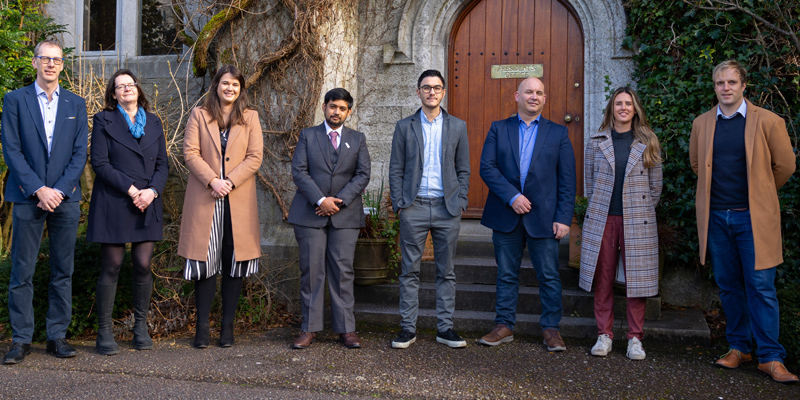School of Engineering Researchers amongst UCC's researchers awarded 3.7m Euro in the EPA Research Call Awards

Prof Edmond Byrne, Dr Niall Dunphy and Dr Archishman Bose are among the 8 UCC Researchers awarded 3.7m in the 2023 Environmental Protection Agency Research Call Awards.
Funded research covers a wide range of areas covering climate change, the natural environment, the green and circular economy, and the environment and human health.
UCC is the highest performing institute in the EPA Research Call Awards 2023.
Cities could learn from Paris’ recent decision to charge higher parking for SUVs, according to a University College Cork (UCC) researcher leading a project on more sustainable urban environments.
Dr Niall Dunphy, of the School of Engineering and Architecture and Environmental Research Institute, made the comments as his project was announced as one of eight UCC studies awarded a combined €3.7m in environmental research funding.
Dr Niall Dunphy (School of Engineering and Architecture and the Environmental Research Institute)
Project Title: JustCities Hub
Project Co-Leads: Dr Alexandra Revez (MaREI), Professor Brian Ó Gallachóir (Associate Vice-President of Sustainability at UCC and Director of the Environmental Research Institute) , Dr Gerard Mullally (Department of Sociology and Criminology)
Funding amount: €593,579
Professor Edmond Byrne (School of Engineering and Architecture and the Environmental Research Institute/MaREI)
Project Title: Deep Societal Innovation for Sustainability and Human Flourishing (DSIS).
Project Co-Leads: Professor Maggie O’Neill (Department of Sociology and Criminology and ISS21), Dr Ian Hughes (Environmental Research Institute/MaREI)
Funding amount: €593,519
The accelerating impacts of climate change, allied to the challenges of meeting 2030 goals (and beyond), has stirred a sense of urgency for policy responses and societal and behavioural changes needed to embark upon the structural transformations required to tackle pressing global challenges. DSIS seeks to develop a methodological basis for conceptualising the deep whole of society transformation required to engage on a trajectory towards authentic sustainability and human flourishing, which can create narratives for deep, rapid, whole of society transformation, and employ those narratives to inform policy making and public discourse on climate change and sustainability. DSIS is an inter- and transdisciplinary, inter-institutional, and international initiative, anchored at, and emanating from a well-developed research base in this area at UCC, and includes researchers and academics from MaREI and ISS21.
Dr Archishman Bose (School of Engineering and Architecture and the Environmental Research Institute/MaREI)
Project Title: Mapping the Role of End-of-Life Tyres for a Sustainable Circular Economy in Ireland (ENTYRE)
Project Co-Leads: Dr Gillian Collins (School of Chemistry) and Dr Richard O’Shea (School of Engineering and Architecture)
Funding amount: €143,071
Tyres are the wheels of modern civilisation. In the European Union (EU), over three hundred million units of tyres are sold annually. These tyres, evidently reach their end of life (EOL) and requires disposal, reuse, or repurposing. Upcoming local and EU regulations will severely limit the current uses of EOL tyres and would require critical analyses of the alternative pathways of use and repurposing of waste tyres in Ireland. Accordingly, this project, Mapping the Role of End-of-Life Tyres for a Sustainable Circular Economy in Ireland (ENTYRE), is aimed at performing a deep review of existing practices and literature regarding utilisation pathways of waste EOL tyres in terms of their techno-economic and environmental impacts as well as from the light of current and upcoming local (Irish) and international (EU) policies. Through the interaction with relevant stakeholders, industries, and decision makers using questionnaires and workshop (s), this 12-month project will aim to produce industry and policy papers and briefs for valorisation of EOL tyres in Ireland.
School of Engineering and Architecture
Scoil na hInnealtóireachta
Contact us
Electrical Engineering Building, UCC, College Road, Cork.
